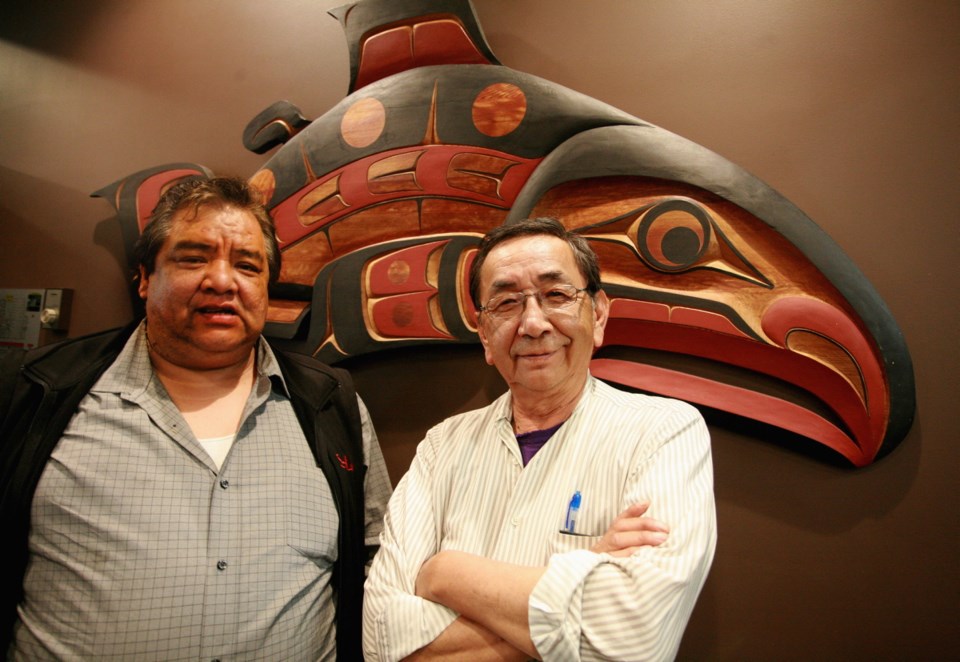Thousands of elementary-school kids will be piling into the Q Centre on Monday. The occasion: Music Monday, a national event in which schools across the country celebrate music education at the same time.
This year, Raymond Jones Peter Jr. a member of Cowichan Tribes who likes to be called Brother Rick by students, will be front and centre in the Colwood arena teaching the Sooke School District participants the Hy’chka Siem song. Translated into English from the Coast Salish language Hul’q’umi’num’, it means “Thank you.”
“The children will be singing ‘Thank you’ to their teachers, parents, aunties, uncles and to everyone else who helps take care of them,” said Peter.
My favourite part of this is Peter is teaching this song to all the students in the district, Indigenous and non-Indigenous. It sends the message to all students and every adult in the arena that these Indigenous teachings are important for everyone, and they should be valued.
Peter is well-known in the schools; he teaches a variety of Indigenous workshops, lessons and music, and is also a friendly face for students looking for conversation. School District 62 has many Indigenous role models working throughout all of its schools, including Henry Chipps, an elder in residence from Beecher Bay First Nation.
Peter and Chipps teach lessons on a variety of topics, including residential schools and Indian day schools.
“I moved to Beecher Bay when I was five to avoid going to residential school,” said Chipps, 66. “I did end up going to the Indian day school at Songhees Nation for two years.” Peter also attended Indian day school.
I think students, Indigenous and non-Indigenous, will learn far more from hearing first-hand lived experiences than they could from a textbook.
“I had a young student ask his teacher to ask me what it would be like if there was never colonization,” Peter said, explaining how these lessons are prompting the young children to question things and see things from an Indigenous perspective.
As a journalist, I love a good story, and I know when you hear it from the source, it has a far deeper impact. It’s that impact that is going to change things and help everyone, regardless of their age, have a deeper level of understanding.
“After talking to a Grade 5 class about residential schools, a kid came up to me and thanked me for the lesson and said: ‘I am sorry for what happened during all those years,’ ” said Chipps. “It was breathtaking.”
When I was in the ninth grade, my middle school offered a work-experience class. Students would be assigned to a local business and work there during their class block.
I went to school in Calgary and was assigned to work in a fast-food restaurant. I had only been working there for a few days when the two middle-aged women I worked with started speaking to each other very inappropriately about Indigenous people.
I was taking ice-cream cakes out of pans when she began to say that Indigenous people weren’t human. It was awful. I stayed silent.
I had heard a lot of racist jokes in my youth, and often they were even directed at me. This comment was hands-down the worst thing I’d ever heard. I was only 14.
I finished up the class block and walked back to school. I started crying and told my teacher what had happened. I was asked if I was sure I heard them correctly, and a few other irresponsible comments from the teacher.
Later the teacher told me she called the restaurant and they apologized “because they didn’t know I was Indigenous.”
I told the teacher that the school should remove the restaurant from the school work-experience program. She didn’t listen to me. She moved me to another location, and sent a non-Indigenous student to work there.
I thought back to this experience as I was meeting with Peter and Chipps. If they had a presence in my school at the time, I would have gone to them for guidance and help.
I shared this story with them and they agreed they would have helped me. They would have educated the teacher and ensured no other students were sent to work there.
Charla Huber works in communications and Indigenous relations for M’akola Group of Societies.



